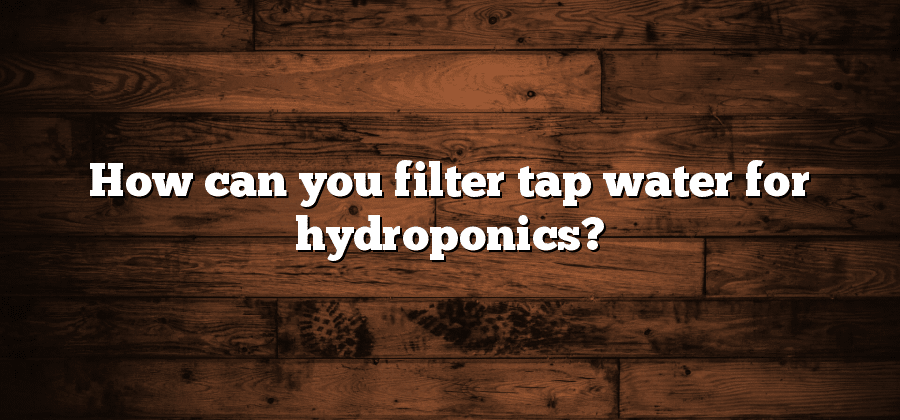Water Quality for Hydroponics
Hydroponics is a method of growing plants without using soil, relying instead on a nutrient-rich water solution. The water quality for hydroponics plays a crucial role in the success of any hydroponic system. It is essential to understand the importance of maintaining the right balance of nutrients and water pH levels to ensure optimal plant growth.
When it comes to water quality, **pH** is a key factor to consider. The pH level represents the acidity or alkalinity of the water and can significantly affect nutrient availability for plants. Most hydroponic crops thrive in a slightly acidic to neutral pH range, typically between 5.5 and 6.5. However, different plants may have specific pH preferences, so it is essential to research the ideal range for the crops you intend to grow. To determine the pH of the water, specialized pH meters or test kits are commonly used in hydroponics. Maintaining the correct pH level will enable plants to absorb essential nutrients efficiently, promoting robust root development and overall growth.
In addition to pH, it is equally important to consider the presence of **contaminants** in the tap water used for hydroponics. Tap water can contain various contaminants, including chlorine, heavy metals, and organic compounds, which can be harmful to plants. These contaminants can affect the nutrient solution, inhibit nutrient uptake, and ultimately hinder plant growth. Understanding tap water contaminants allows hydroponic growers to make informed decisions on water filtration methods to ensure a clean and safe water supply for their plants.
Water Filtration Methods for Hydroponics
Water filtration is a crucial aspect of hydroponics, as it ensures that the water used in the system is free from contaminants that could harm the plants. There are several effective methods available for filtering water in hydroponics setups. One common method is the use of activated carbon filters, which are designed to remove organic substances, chlorine, and other impurities from the water. These filters work by trapping the contaminants in the tiny pores of the carbon granules, leaving the water clean and safe for hydroponic use.
Another effective filtration method for hydroponics is reverse osmosis (RO). RO systems use a membrane to separate water molecules from the dissolved minerals and contaminants, producing purified water. This method is highly efficient in removing a wide range of contaminants, including heavy metals, pesticides, and bacteria. However, it should be noted that RO systems also remove beneficial minerals from the water, which might require additional supplements to maintain optimal plant growth. Overall, the choice of water filtration method for hydroponics depends on the specific needs and requirements of the system, ensuring that the plants receive clean and well-balanced water for optimal growth.
Understanding Tap Water Contaminants
Tap water is a convenient and easily accessible option for many hydroponic growers. However, it is crucial to understand the potential contaminants that may be present in this water source. One of the common contaminants found in tap water is chlorine, which is added by municipal water treatment facilities to kill harmful bacteria and viruses. While chlorine serves its purpose in ensuring water safety, it can have negative effects on the plants in a hydroponic system. High levels of chlorine can harm the beneficial microorganisms in the nutrient solution, disrupting the overall balance of the system. Therefore, it is important to consider strategies to remove or mitigate the chlorine content in tap water used for hydroponics.
Another common contaminant found in tap water that can impact hydroponics is heavy metals. These metals, such as lead, copper, and zinc, can find their way into the water supply through various means, including corroded pipes or industrial runoff. In high concentrations, heavy metals can be toxic to plants and can cause stunted growth, nutrient deficiencies, and even plant death. Additionally, heavy metal accumulation in the plant tissue can pose health risks to humans when consumed. Therefore, it is imperative for hydroponic growers to be aware of the potential presence of heavy metals in their tap water and take necessary steps to address this issue, ensuring the health and wellbeing of both the plants and the consumers of the produce.
Determining the pH of Tap Water
Tap water is commonly used as a source of water for hydroponic systems. Before using tap water, it is crucial for hydroponic growers to determine its pH level. The pH of tap water can have a significant impact on the overall success of a hydroponic setup, as it directly affects the nutrient availability to plants.
To determine the pH of tap water, a pH testing kit or meter can be utilized. These tools provide an accurate measurement of the acidity or alkalinity of the water. The pH scale ranges from 0 to 14, with a pH of 7 considered neutral. A pH below 7 indicates acidity, while a pH above 7 indicates alkalinity. In hydroponics, the ideal pH range for most plants is between 5.5 and 6.5. This slightly acidic environment allows for optimum nutrient absorption, as it promotes the availability of essential elements that plants need to thrive.
Remember, monitoring and adjusting the pH of tap water is crucial for maintaining a healthy hydroponic system. Failure to do so may result in nutrient deficiencies or toxicities, ultimately impacting plant growth and yield. By regularly testing the pH of tap water and making necessary adjustments, hydroponic growers can create an optimal growing environment for their plants, setting the stage for successful hydroponic cultivation.






